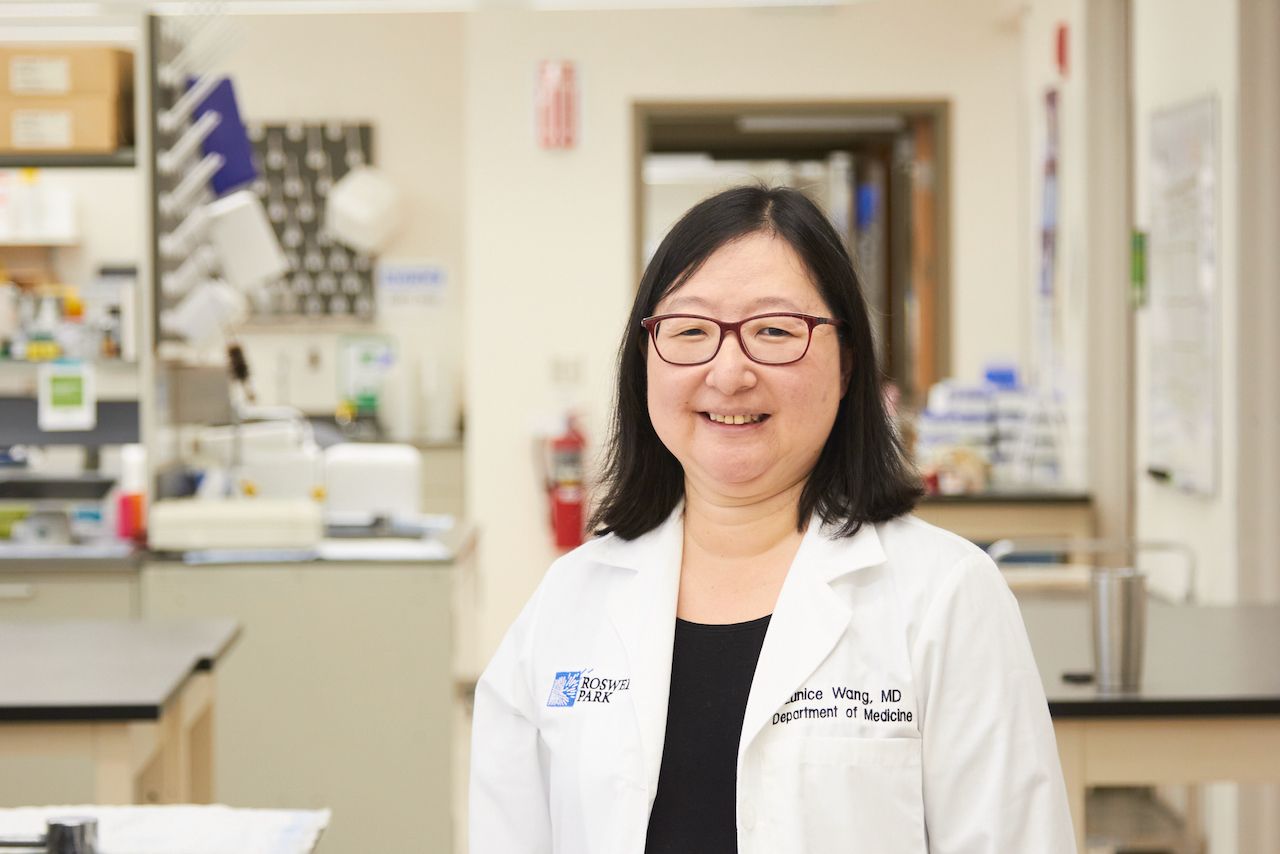Roswell Park’s Dr. Eunice Wang delivers latest results from KOMET-001 clinical trial
- Ziftomenib produces deep, durable responses in patients with NPM1 mutations
- Potential new treatment option for those with relapsed/refractory disease
- Investigational drug granted Breakthrough Therapy designation by FDA last year
BUFFALO, N.Y. and CHICAGO — An international clinical trial co-led by Roswell Park Comprehensive Cancer Center has demonstrated that the investigational drug ziftomenib can produce deep, durable responses in people with a specific biological subtype of acute myeloid leukemia (AML). Eunice Wang, MD, Chief of Leukemia at Roswell Park, will present phase 1B/2 results of the KOMET-001 study (NCT04067336) during an oral abstract session Monday at the American Society of Clinical Oncology (ASCO) Annual Meeting in Chicago.
The NPM1 mutation affects about 30% of all AML patients. In almost half of those patients, relapse or resistance to standard treatments occurs within a year of treatment. At that point, outcomes are poor, with fewer than 10% achieving a complete response to therapy, and median survival of only 6.1 months.
Ziftomenib is a potent and selective menin inhibitor, one of a new class of targeted agents that blocks the interactions of two proteins (menin and KMT2A) that are crucial for specific types of acute leukemia cells to survive and multiply.
“The results of this phase 2 trial establish the potential for ziftomenib to induce responses and prolong life in responding patients with relapsed or refractory acute myeloid leukemia characterized by NPM1 mutations, a disease which currently carries a poor prognosis with no approved targeted treatment options,” says Dr. Wang, a hematology expert and Professor of Oncology in the Department of Medicine at Roswell Park.
By late 2024, the phase 2 KOMET-001 trial had enrolled 112 patients in North America and Europe — all with relapsed/refractory NPM1-mutated AML. Patients received ziftomenib 600 mg orally once a day as monotherapy, without additional drugs. In phase 2, at a median follow-up of 4.2 months, 23% (21 of 92 patients) achieved complete response (CR) or complete response with partial hematological recovery (CRh), meaning their blood cell counts had partially returned to normal after treatment. Of the 23% who were tested, 67% (10 of 15 patients) had no detectable disease by measurable residual disease testing. Ziftomenib was generally well tolerated, with only 3% of patients (3 of 112) in the combined phase 1B/2 population discontinuing treatment due to treatment-related adverse side effects.
KOMET-001 recruited AML patients with relapsed or refractory AML who were not eligible for any other standard-of-care treatments. Phase 1, which ran concurrently with phase 2, focused on fine-tuning the optimal dosage for ziftomenib monotherapy. Initial results of the phase 1 portion of the study, published in The Lancet Oncology, demonstrated the drug’s activity in patients with NPM1 mutations and KMT2A rearrangements. Phase 2 specifically examined the safety, tolerability and anti-leukemia activity in patients with relapsed/refractory AML characterized by the NPM1 mutation.
The findings are especially important because currently more than half of AML patients do not have mutations for which targeted drugs are available, so they are treated with cytotoxic, or cell-killing therapies, such as chemotherapy, which produce subpar clinical outcomes.
Based on the results of the initial phase 1 clinical trial, the FDA granted ziftomenib Breakthrough Therapy designation to potentially speed its development and review. Ziftomenib is currently undergoing FDA review for consideration for new drug approval in adult patients with relapsed or refractory NPM1-mutant AML.
The study is sponsored by Kura Oncology Inc. Study authors include representatives of academic centers in the U.S., France, Spain, Italy and Germany.
Dr. Wang, who holds a secondary faculty appointment with the University at Buffalo’s Jacobs School of Medicine and Biomedical Sciences, notes that Roswell Park leukemia patients were among the first in the world to be treated with ziftomenib. These clinical trials were part of the Roswell Park Comprehensive Cancer Center Early Phase Leukemia Clinical Trials program, made possible by support from the Roswell Park Alliance Foundation.
Presentation details
Abstract 6506, Oral Abstract Session
Monday, June 2, 4:36 p.m. CDT, S100a
Presenting author: Eunice Wang, MD, Roswell Park Comprehensive Cancer Center
###
From the world’s first chemotherapy research to the PSA prostate cancer biomarker, Roswell Park Comprehensive Cancer Center generates innovations that shape how cancer is detected, treated and prevented worldwide. Driven to eliminate cancer’s grip on humanity, the Roswell Park team of 4,000 makes compassionate, patient-centered cancer care and services accessible across New York State and beyond. Founded in 1898, Roswell Park was among the first three cancer centers nationwide to become a National Cancer Institute-designated comprehensive cancer center and is the only one to hold this designation in Upstate New York. To learn more about Roswell Park Comprehensive Cancer Center and the Roswell Park Care Network, visit www.roswellpark.org, call 1-800-ROSWELL (1-800-767-9355) or email ASKRoswell@RoswellPark.org.
Annie Deck-Miller, Director of Public Relations
716-845-8593; annie.deck-miller@roswellpark.org
